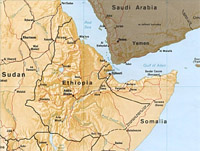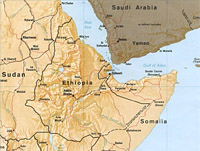
Trade between Yemen, Horn of Africa, and Red Sea Countries under WTO Agreements [Archives:2001/36/Business & Economy]
September 3 2001
Dr. Saleh Amer Hassan
General Director of the Presidential Office
& a Committee Member for WTO
1-The importance of Trade among Red Sea Countries:

Coming to the main point regarding the importance of trade among Red Sea countries, it is very well known that trade relations between the Republic of Yemen and some counties in the Horn of African and the Red Sea have led to economic development, especially for countries such as Egypt, Jordan, and Eritrea. Any attempts to further improve and expand those relations will lead to a significant increase in the volume of trade among the countries of this region and will have a direct effect in encouraging other countries including the Republic of Yemen to get involved and enhance its trade relations with its neighbors.
Until this very day, there seems to be no specific nomenclature regarding economic cooperation between the countries of the Horn of the Africa and Red Sea countries. This is due to political, social, and geographical obstacles. The differences continued to grow resulting in great challenges for a common ground for all countries to operate. The last few decades witnessed continuous division and disputes among the countries, especially in the political sense including the Eritrean/Etheopian war and the Eritrean/Yemeni border dispute.
However, it is still undeniable that the possibility of increasing the trade volume among some of the countries of the Horn of Africa and Red Sea is significant.
The Yemeni government’s working plan, represented on the agenda of the People General Conference (PGC) has stressed the necessity of improving trade between our country and the Horn of Africa.
The platform stipulated the following main points:
Proposing a specific and essential policy in which export and import specialists (to and from the countries of the Horn of Africa) could compete with each other in local and foreign markets.
Exerting great efforts with the neighboring countries to establish free trade zones and applying the ratified agreements signed with those countries in this respect in order to make use of the strategic location of Yemen towards the regional markets.
Paying more attention to exporting locally produced goods and activating the role of the Supreme Council to revitalize exportation to foreign markets and facilitating the process of transportation to those countries.
Paying special attention to regional economic cooperation based on serious participation of Yemen for the sake of the regional stability and establishing the economic common interests particularly in the Arabian Peninsula and the countries of Horn of Africa.
It is noticeable that the future of trade relations in Red Sea countries within the framework of the (WTO) has an optional trait. It is not obligatory for some countries to sign all these agreements. There are obligatory and non-obligatory agreements signed by WTO members. The future of the trade relations among those countries will be included in agreements of the WTO. Despite the small number of WTO members in the region, namely: Djibouti, Jordan, Kenya, Egypt, and Israel, any country has the right to establish trade relations with all other countries.
The 28th agreement of the WTO enables non-member countries to get exemptions, facilities and privileges granted to the less developed countries.
The general atmosphere of developing such relations is the bilateral trade among these countries which possess huge economic and human potentials as well as mineral wealth. It is possible for these countries to start trade by importing goods from and exporting to neighboring countries in accordance with the level of social and economic cooperation. In addition to this, WTO will be able to utilize their membership to aggressively search for greater economic and trade relationships at regional and international levels without the need to restrict themselves to the Red Sea region.
2- The volume of trade among the countries of the Horn of Africa
The trade volume among the countries of the Horn of Africa confirmed by the Yemeni Government’s statistics of 1995-2001 is very low. Since trade exchange is still in its infancy, it is essential for these countries to establish trade centers to exhibit their locally produced goods and products.
It would be useful for some of the countries of the Horn of Africa to launch trade exhibitions in their neighboring countries. Several exhibitions held in Yemen, Djibouti and Eritrea were quite successful in introducing the potential of trade exchange between those countries.
It is also possible for these countries and in accordance with the WTO agreements ratified in Uruguay in 1993 and officially signed in Morocco in 1994 to establish an international trade group in this region. But due to the fact that most of the countries are not WTO members, such a step would require more time.
Among the countries of the Horn of Africa and Red Sea, only five countries gained permanent membership, four gained the status of monitor members, and three countries haven’t joined the WTO at all. Consequently, these countries do not have the right to enjoy WTO privileges and exemptions that apply to the least developed countries.
It has to be mentioned here that the agreements are valid only to the countries that have WTO permanent membership. The WTO has expressed its keenness on facilitating international sea trade among countries of the world and establish a unified free zone and making use of international, regional, and local agreements with the aim of laying the foundation stones of intensive regional trade activities, attracting foreign capitals and investing such capitals within the framework of international trade agreements.
It has to be mentioned here that almost 80% of the countries in the organization belong to the third world.
——
[archive-e:36-v:2001-y:2001-d:2001-09-03-p:./2001/iss36/b&e.htm]


